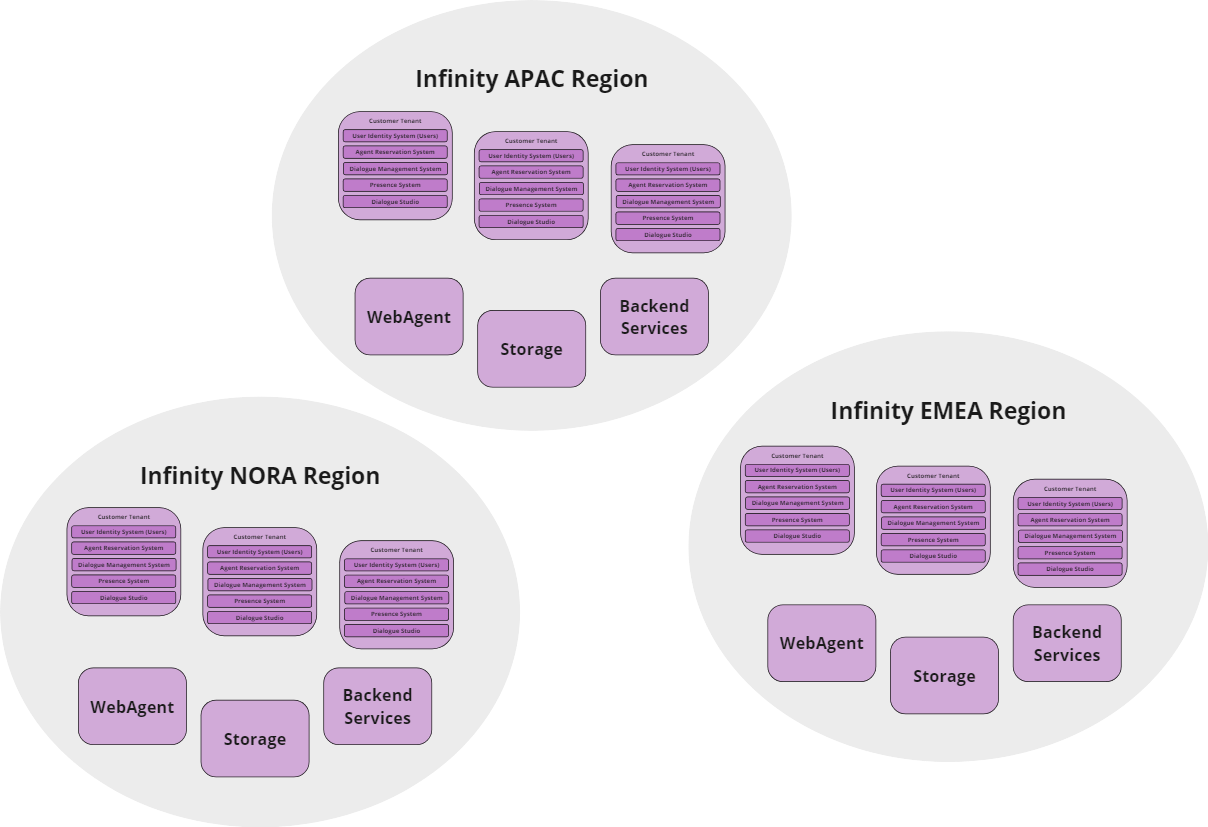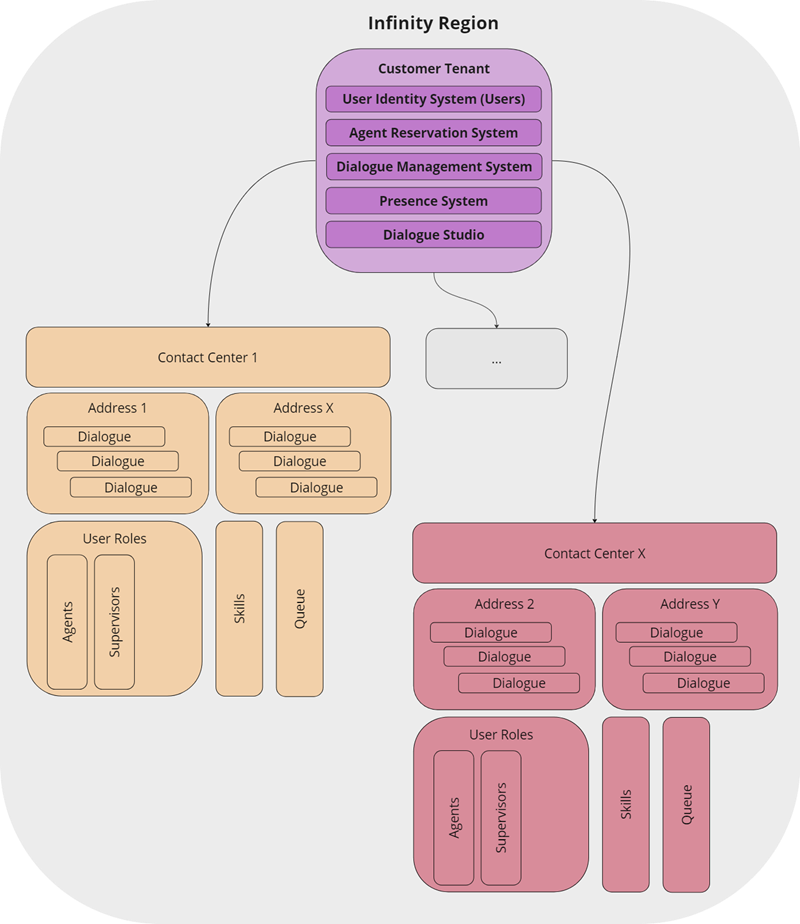Infinity entities explained
This article delves into the different entities and their organizational structure.
Infinity Regions
Infinity Regions refer to distinct geographical areas within our global infrastructure, each designed to deliver a full suite of resources and services tailored to meet regional demands and compliance requirements.
Key Characteristics:
-
Geographic Distribution: Resources are provisioned from a single geographic location – EMEA (Europe, the Middle East, and Africa), or NORA (North America).
-
Independence of Regions: Each region operates independently to ensure compliance with local data laws and optimize performance, without sharing resources with other regions.
-
Multi-Tenancy and Services: Each region hosts multiple Customer Tenant, providing essential services such as compute, storage, and networking to ensure full functionality.
Customer Tenant
AnywhereNow enables the creation of a Customer Tenant per Infinity Region. Each Customer Tenant is a self-contained unit, providing localized control and autonomy in management.
Key Characteristics:
-
System-Wide Management: The Customer Tenant Administrator is the central authority for overarching system configurations.
-
Contact Centers: It envelops multiple Contact Centers, each resembling an organizational structures or customer service objectives.
-
Data Uniqueness: Guarantees the distinctiveness of Users, Addressses, and Dialogues, crucial for maintaining data integrity and facilitating precise analytics, between tenants.
-
User Identity System (Users): Accommodates multiple Tenant Users, directly retrieved from your Azure Active Directory. Each can be assigned distinct roles such as Agent, Dialogue Studio Editor/Viewer, Report Viewer, and Administrator.
-
Agent Reservation System: Incorporates a specialized Agent Reservation System that collaborates with the Presence System to optimize agent allocation and prevent scheduling conflicts.
-
Reporting: Employs unique dialogue IDs via the Dialogue Management System, enhancing the accuracy and consistency of reporting across Contact Centers.
-
Address Mapping: Monitors the association of Addresses with Contact Centers, ensuring each Address is exclusively linked to one Contact Center for clear communication pathways.
Note
Linking an Address to the Dialogue Studio is also feasible. This capability allows for the creation of intricate flows that connect the Address to multiple contact centers, based on a variety of criteria.
Contact Center
The Contact Center is a pivotal element within AnywhereNow, functioning as an independent unit under the Customer Tenant for managing customer interactions with precision and adaptability.
Key Characteristics:
-
Organizational Flexibility: Designed to align seamlessly with both organizational structures and customer service objectives, ensuring a responsive and customer-centric approach.
-
Comprehensive flow building: Equipped with a Flow-Builder Environment (Dialogue Studio), it allows for the creation of dynamic interaction flows, while the inclusion of multiple unique Addresses, and a singular Queue streamlines the handling of customer dialogues.
-
Simplified Operations: In its most basic configuration, the Contact Center can operate without complex flows, directly queuing Dialogues to all associated Agents, thus ensuring service continuity and simplicity.
Address
In the AnywhereNow architecture, an Address (Resource Account) represents the touchpoints for customer interactions, which can include phone numbers.
Key Characteristics:
-
Exclusive Ownership: All Addresses are owned by the Customer Tenant and linked to a single Region, which guarantees that each Address is associated with only one Contact Center. This ownership ensures that the Addresses are not shared or duplicated across different centers.
-
Contact Center Linkage: Each Address can be linked to a single Contact Center.
Note
Linking an Address to the Dialogue Studio is also feasible. This capability allows for the creation of intricate flows that connect the Address to multiple contact centers, based on a variety of criteria.
User
Within the AnywhereNow framework, 'User' refers to the individuals who fulfill various operational roles within the Contact Centers, all under the overarching governance of the Customer Tenant.
Key Characteristics:
-
Diverse Roles: Users encompass a range of roles including agents, who handle direct customer interactions; supervisors, who monitor and guide the service quality; and administrators, who manage the Contact Center’s infrastructure and resources.
-
Identity Uniqueness: The Customer Tenant User Identity System is a robust mechanism that ensures each user is distinct across the entire system, preventing any overlap and ensuring clear accountability.
-
License Management: Administrators have the capability to be assigned a CTI license for platforms such as Dynamics365, , and Salesforce. This feature enables Customer Tenant Administrators to manage their own license access, ensuring they have the necessary tools to perform their duties effectively and efficiently. It also allows for better resource allocation and cost management within the Contact Center’s operations.
Skill
In the AnywhereNow architecture, ‘Skill’ represents a fundamental concept that connects Agents with the Dialogues that align with their expertise and proficiency.
Key Characteristics:
-
Optimized Agent-Dialogue Connection: Skills are the mechanism that links Agents to Dialogues they are best equipped to handle, ensuring a high-quality customer service experience by matching customer needs with Agent expertise.
-
Contact Center-Specific Definition: Each Skill is defined within the context of a Contact Center, allowing for a tailored approach to service provision and the creation of specialized service teams.
-
Showcasing Agent Expertise: Skills are assigned to Agents as a representation of their abilities and experience, facilitating the optimal allocation of customer Dialogues and enhancing the overall efficiency of the Contact Center.
-
Targeted Dialogue Management: The system allows Dialogues to be queued specifically to Skills, streamlining the routing process and ensuring that customer inquiries are addressed by the most qualified Agents.
Dialogue
In AnywhereNow, ‘Dialogue’ encompasses the various forms of customer interactions, such as phone calls, all meticulously managed within the Contact Centers.
Key Characteristics:
-
Unique Identification: The Customer Tenant Dialogue Management System assigns unique IDs to each Dialogue, facilitating efficient tracking, analysis, and reporting across the system.
-
Workflow Integration: Optionally, Dialogues can be processed through customized flows in the Flow-Builder Environment (Dialogue Studio), allowing for sophisticated management based on predefined workflows.
Queue
In the AnywhereNow architecture, the Queue serves as the central repository for Dialogues that are pending response or action.
Key Characteristics:
-
Singular Entity: Each Queue is a unique entity within its respective Contact Center, acting as the main hub for incoming Dialogues.
Flow-Builder Environment
The Flow-Builder Environment is a specialized area within the AnywhereNow framework, provided by Dialogue Studio, dedicated to workflow customization and dialogue routing.
Key Characteristics:
-
Center-Specific Customization: The Flow-Builder Environment is tailored uniquely to each Contact Center, allowing for precise customization that aligns with the specific needs and strategies of the center.
-
Workflow Optimization: It serves as a powerful tool for designing and implementing efficient workflows, ensuring that dialogues are routed effectively to enhance customer interaction and service quality.

